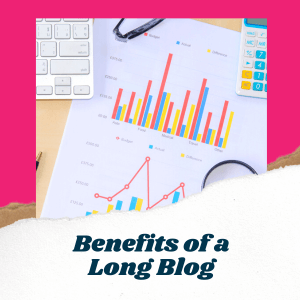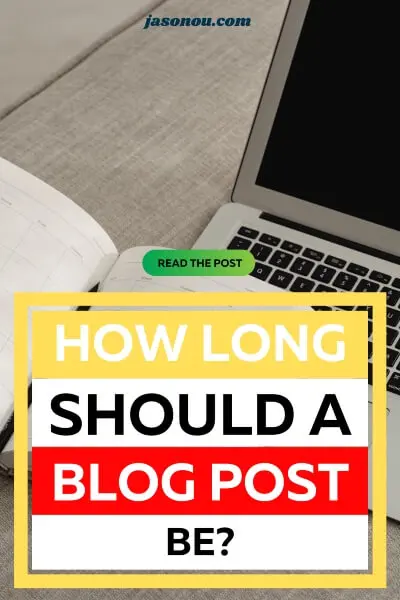What is The Ideal Length of a Blog Post in 2025?
What is the ideal length of a blog post? It’s a valid and common question that many new bloggers are unsure of as to whether they should write long or short blog posts.
The fact is different blog posts will vary in length due to the nature of the topic. However, most sources suggest that longer posts tend to perform better on search engines and social media, and the sweet spot seems to be around 1,500-2,500 words.
This article will guide you through understanding the ideal length, considering factors such as audience, intent, and content type.
Let’s unravel this blogging mystery together!
Key Takeouts
- Tailor the length to your niche, audience, and intent: Consider factors like niche, audience, and intent: Shorter, concise posts work well for some fields, while others require longer, in-depth articles.
- Consider search intent and keywords: Understanding what your audience is searching for and aligning your content with their specific needs is crucial.
- Longer posts offer benefits but focus on quality: While there is no one-size-fits-all answer, longer blog posts tend to perform better on search engines and social media.
- Focus on providing valuable and engaging content that resonates with your readers, regardless of the length. Avoid fluff and ensure your posts are relevant, informative, and engaging.
Factors to Consider for Determining Blog Post Lengths
This page have some affiliate links. In other words, if you buy from my links, I may get a commission. And some of the images were sources from Unsplash+.
But before we go on …
Your priority should always be on your readers. This means you should prioritize reader experience over search engine optimization.
The key to blogging is to make it relevant, informative, and engaging.
So. Don’t fill your blog with fluff for the sake of it and hit that ideal blog post length.
Focus on quality over quantity.
Having said that.
When determining the ideal length for a blog post, consider factors such as the subject matter, target audience, and buyer persona, stage in the buyer’s journey, and search intent and keywords.
Niche or industry
Understanding your niche or industry is a crucial starting point in determining the ideal length for your blog post.
In some fields, short and concise posts are more appealing to readers because they deliver information promptly without overwhelming them with details.
Consider tech news updates, where quick reads often reign supreme.
On the other hand, niches like health, finance, and marketing often demand longer, in-depth articles due to their complex nature requiring thorough explanations.
Knowing what works best within your own industry is key to creating content that resonates with your audience while optimizing SEO performance.
Target audience and buyer persona
Understanding your target audience and buyer persona is crucial when determining the ideal length of your blog posts.
Every blog post should be tailored to meet the specific needs and preferences of your readers.
Consider who your target audience is: their age, gender, interests, and online behavior.
By analyzing these factors, you can better understand how long they are willing to engage with content.
It’s also important to consider where your audience is in their buyer’s journey.
Are they just starting their research or are they ready to make a purchase? The stage of the buyer’s journey affects what type of information they’re seeking and how much detail they require.
Remember that search intent and keywords play a significant role as well. Conduct keyword research to identify what phrases or questions people are searching for related to your topic.
This will help you optimize your blog post length by providing relevant information while ranking higher in search engine results.
Stage in the buyer’s journey
Understanding the stage in the buyer’s journey is crucial when determining the ideal length of your blog post.
Are you targeting customers who are unaware of their problem, in the consideration phase, or ready to make a purchase?
For those at the early stages, shorter blog posts around 500 words can provide helpful tips and introductory information.
As potential customers move closer to making a decision, longer blog posts with deeper insights and analysis (around 1000-2000 words) have more impact.
By tailoring your content to match each stage, you can effectively engage your audience and guide them toward conversion.
Search intent and keywords
Understanding the search intent and using the right keywords are crucial factors in determining the ideal length of a blog post.
When it comes to search intent, you need to consider what your audience is looking for when they perform a search.
Are they seeking information, looking for a solution to a problem, or hoping to make a purchase?
By aligning your content with their specific needs, you can better determine the optimal length.
Also, incorporating relevant keywords that resonate with your target audience and have a high search volume can help drive organic traffic to your blog.
So while there isn’t a one-size-fits-all answer to the ideal length of a blog post, keeping these factors in mind will ensure your content reaches its intended audience effectively.
Ideal Length of Blog Posts for Different Types of Content
There is no one-size-fits-all answer to the ideal length of a blog post. Different types of content require different word counts to effectively convey information and engage readers.
So, what is an ideal length of a blog post? Let’s dive in and find out!
500-word blog posts
When it comes to blog post length, 500-word articles have long been considered a standard format. These shorter posts are perfect for covering specific topics or sharing concise information.
They’re great for capturing readers’ attention and delivering quick insights.
Plus, they require less time and effort to create, making them ideal for bloggers who want to produce content more frequently.
In terms of SEO, 500 words can still provide enough room to incorporate relevant keywords and optimize your post for search engines.
So if you’re looking for a quick but impactful way to engage your audience, consider writing 500-word blog posts that pack a punch!
1000-word blog posts
Blog posts that contain around 1000 words are often considered to be the sweet spot for many bloggers.
This length allows you to delve into a topic in more depth, providing valuable and detailed information for your readers.
At 1000 words, you have enough space to include supporting evidence, examples, and actionable tips without overwhelming your audience with excessive content.
Additionally, search engines tend to favor longer articles as they provide more comprehensive and authoritative information on specific topics.
So if you’re looking to strike a balance between reader engagement and SEO optimization, aiming for around 1000 words is generally a good choice when crafting your blog posts.
Benefits of writing long-form blog posts (2000+ words)
Long-form blog posts, those with a word count of 2000 words or more, offer several benefits for bloggers and content marketers.
Firstly, these longer posts tend to rank higher in search engine results due to their comprehensive nature and ability to cover topics in-depth.
To back this up. HubSpot’s 2021 study found that the optimal length for a blog post to improve SEO is between 2,100-2,400 words.
This means increased visibility and organic traffic for your blog.
As well, long-form content allows you to showcase your expertise and provide readers with valuable insights that shorter articles may not convey.
It also encourages social sharing as people are more likely to share informative and well-researched content with their audience.
Lastly, by writing longer articles on a regular basis, you can establish yourself as a thought leader in your niche or industry.
So, What is the Ideal Length of a Blog Post?
There is no one-size-fits-all answer to the ideal length of a blog post.
Determining the ideal length of a blog post depends on various factors such as niche or industry, target audience, and search intent.
While shorter posts of around 500 words may be suitable for announcement articles or quick updates, longer posts of 1000 words can provide more in-depth information and facilitate SEO efforts.
Furthermore, writing long-form blog posts with over 2000 words has been shown to offer benefits like increased engagement and higher search engine rankings.
Ultimately, finding the sweet spot between providing valuable content and keeping readers engaged is a big key to creating successful blog posts.
Disclosure: This post may contain affiliate links, which means I’ll receive a commission if you purchase through my links, at no extra cost to you. Please read full disclosure for more information.
You Might Want to Check This Out Too
Resources To Grow Your Business With
Bluehost
Bluehost is a great starting point for beginners or bloggers who want to switch to a reliable web hosting service. And it gives you the best bang for your buck – starting at $2.95 a month*.
With the entry-level hosting plan, you’ll get a high up-time, reliable customer support, and 30 day money back guarantee.
You can sign up with Bluehost here.
WPX Hosting
It’s a web-hosting service I love using. It specializes in WordPress hosting, and depending on what package you opt for, you can host 5 or more sites on one account. The best bit is – the quick turnaround in support is top notch.
For bloggers who have an established blog, this is a fantastic option.
You can learn more about this service here.
Aweber
Building an email list of a growing audience is essential for the longevity of any business. This autoresponder service is easy to use, and it is a great starting point for someone looking to kickstart their email campaign. You can try their free account here.
Hi, I’m Jason Ou (surname aka, Oh). I am a Solopreneur and Blogger. My mission is to help fellow entrepreneurs (like you) to profit from their passion online. Let’s connect on Facebook now.





